Breadcrumb Trail Links
Local NewsColumnists
Article content
But for the sound like shattering glass, all was birdsong and whispering breeze.
I was parked by a mixed stand of aspens, saskatoons and poplars with all the windows rolled down in the truck. Cold -18C air was quickly replacing that which had been warmed by the heater and eliminating the heat ripples that I knew would plague my photos. And with that chill air came the sounds of the mini forest around me.
Advertisement 2
Article content
Article content
I was in the gap between the Wintering Hills to the north and the Chimney Hills to the south. Next to me was a dry slough surrounded by aspens and willows and a couple of spring seeps that watered stands of tall poplars. A light dusting of fresh snow covered the ground while ice from frozen fog clung to pretty much everything around me.
There was just the slightest breeze, just enough to vibrate the dry leaves, and with its whisper came the sound of birds.
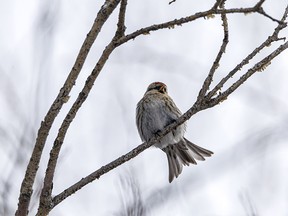
I’d pulled over here to take pictures of the frost but as I sat with the windows down, a flock of redpolls flew from a field up the road and landed among the trees and shrubs next to me. I could hear them chirping and chittering so I turned my attention from the frost and hoped that they would come out from among the tangle of branches and allow me a couple of pictures.
There were chickadees in the trees as well. And a woodpecker. And magpies because, of course, there are always magpies. A raven flew by, croaking as it went. With the sound of the birds came the soft hiss of dry leaves shaking in the soft breeze. Then came the crashing.
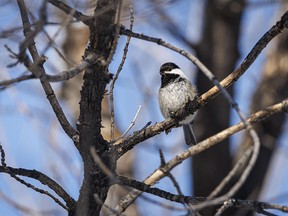
It was suddenly all around me, a clattering, tinkling sound like the aftermath of a rock through a windowpane. I knew right away what it was, of course, but I still looked around to see if I could find the source. And there it was, back in the tall poplars rising behind the thicket in front of me.
Advertisement 3
Article content
It was ice, ice that had formed on the branches from the freezing fog that was now being shaken loose by the breeze. I could see it falling, thin sheets cascading down and dislodging the ice on the branches below. I tried to photograph it but it just too quick and unpredictable.
The redpolls were easily as quick and unpredictable but I managed to get focused on a couple of them. By then, though, I had been sitting in that -18C cold for close to half an hour. Time to fire up the truck, rewarm myself and drive on.
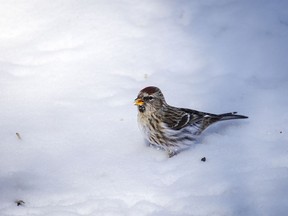
I rolled east and then north across the top of the Wintering Hills before dropping down toward Dorothy and the Red Deer River valley. The mist was thinner up here and the sun was breaking through, brightening the snow that had fallen the day before. It lay like a cottony blanket over the fields and hung in drooping drifts over the coulee edges.
The temperature, already cold, dropped as I descended into the river valley but with the sun now shining it was comfortable. A bit unseasonal but not too terrible.
But, oh my, did that bright sun cause a lot of glare! I almost never wear sunglasses but with the light blasting back at me from that fresh, untrammelled snow, I really wished I’d had a pair with me.
Article content
Advertisement 4
Article content
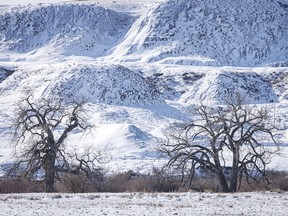
But, mean as it was, it did make the cottonwoods down in the valley stand out against the snowy badlands around them. Thank the deity of your choice that autofocus exists, though. Between my watery-eyed squinting and the magnified brightness coming through the lens, I wasn’t sure if I had anything in focus or not.
Things were easier, though, over in East Coulee.
I love driving through these old coal mining towns here in the valley, rolling slowly along the cottonwood-lined streets close to the river and seeing the pride that the residents place in their yards. And to marvel at all the birds.
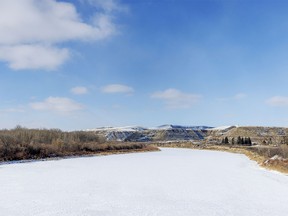
The town was built, by necessity, close to the old Atlas coal mine, and the site that was chosen is on an ancient floodplain dominated by riverine forest. Cottonwoods are the biggest trees but there are balsam poplars and aspens that have blown in over the years plus moisture-lovers like saskatoons, chokecherries and water birch.
All of which make for a lovely home for both the people and the birds.
Of which, the latter vastly outnumber the former, even in winter.
I could hear birds everywhere as I drove slowly along with the windows down. Stopping to photograph a particularly magnificent cottonwood, I could hear flickers, sparrows, magpies, starlings, chickadees and, well, a loudly barking dog. But it was near the end of a riverside street where the jackpot was hit.
Advertisement 5
Article content
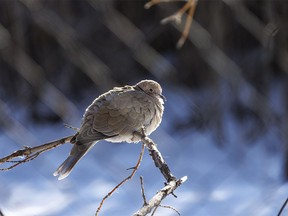
I’d originally stopped because I’d spotted a group of Eurasian collared doves — not native but pretty — that flew off before I could raise the camera. But as they winged away, I noticed the sound around me. It was the same sound as I’d heard among the frosty thicket a couple of hours before but multiplied by 10.
It was coming from a yard just a couple of houses ahead so I crept the truck forward to check it out. The yard had at least three bird feeders that I could see and the trees around them were thronged with birds.
Again, there were redpolls, dozens of them, as well as chickadees and English sparrows. Flickers flew in for a quick sunflower seed or two while little downy woodpeckers took their winnings and were stashing them in cavities on the cottonwoods.
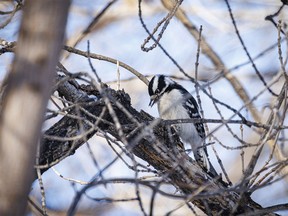
Down here away from the glare in the open sagebrush country back down the river, the light was sweet and dappled but, man, it was a challenge trying to pick out those tiny birds among the branches. But who doesn’t like a challenge, especially one accompanied by an avian chorus.
After a few minutes with the birds, I thanked both them and their feeder-filling benefactors and rolled on. Ahead was Rosedale, another mining town parked in a riverine forest where I’d hoped to find a few more birds.
Advertisement 6
Article content
And I did, though not many. There was the usual contingent of magpies and sparrows but there were also a few collared doves that weren’t quite as camera-shy as the ones back in East Coulee. I’d also hoped to find some deer here. Unusually, I hadn’t seen any at all up that point but pretty much every time I’ve been to Rosedale, I’ve seen some.
Not today.
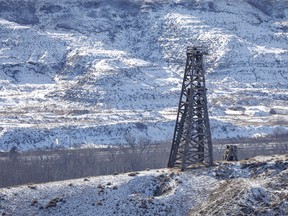
The wind had freshened a bit and the last of the mist had blown away so I decided to cross the river and head up to the north edge of the valley to look back down. From up there you can see Rosedale and the Star Mine below and well up the connecting Rosebud River valley toward Wayne. Everything except the clumps of tall sagebrush looked blue, the clear sky overhead tinting the new snow on the badlands, but at least the air was clear and I could pick out vehicles on the Wayne road 5 km away.
It was getting time to maybe start closing this circle and head back home so I decided to drop back into the river valley, head a bit east and then come out onto the grassland north of Dorothy. Might see some deer, maybe even an antelope or two. So I cut back through the badlands — so pretty with the new snow on all those honey and chocolate tones — and rolled back out of the valley again.
Advertisement 7
Article content
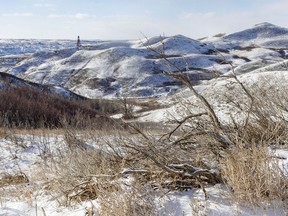
Of deer and antelope, there were none. Nor were there horses or cattle. Of glaring white snow, there was plenty so I hastened back toward Dorothy, stopped for a few minutes to look down on the town through a gap in the snowy hills and then continued on my way.
Back on the south side of the river and atop the Wintering Hills again, I stopped to shoot the sun on the drifted snow among the big wind turbines and to look for more birds. There were tracks by a patch of ice-clad buffaloberries but they who had made them remained unseen.
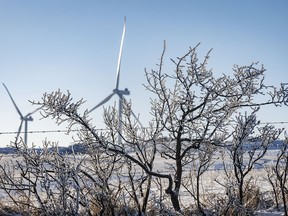
On this side of the hills the air was a bit less clear and I was in and out of mist on the flats around Deadhorse Lake and along the road past Chancellor and Standard. I watched carefully for snowy owls but saw none. Nor, strangely, did I see any deer. This had to be the first day in a very long time that I’d spent a day in the country and not seen any deer.
The sun was nearly down now and the brisk wind was cold as I stopped by a farm yard to photograph horses and a pony in the dying light. And not far from them, among the cattails along Parflesh Creek, I stopped again as the sun dipped behind a bank of cloud on the horizon and was gone.
Advertisement 8
Article content
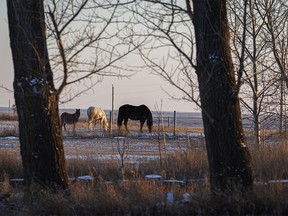
And as I sat there looking through my lens, I could hear clattering all around me. This time, though, it was dry cattail leaves shaking in the wind and making a sound more like somebody dropping an armload of kindling than falling glass. The birds, though, had settled in for the night so the sound of the cattails was all I heard.
Which was a perfectly fine way to end the day.
And the month.
March is here and with it, hopefully, some version of spring. Soon there will be ducks and geese to paddle in the meltwater ponds — if there are any — robins and bluebirds and meadowlarks to brighten the forest and plains.
That, though, is far ahead. So, rolling up the windows and cranking up the heat, I headed on home.
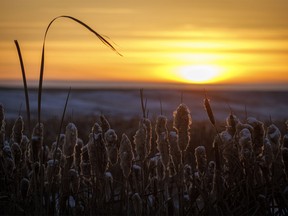
Article content
Share this article in your social network




















